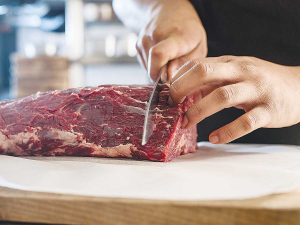Cleland named OSPRI chair
Southland farmer and director Tony Cleland has been named OSPRI New Zealand’s new chair.
 The report claims that NZ is one of the most efficient whole life-cycle producers of beef and lamb in the world.
The report claims that NZ is one of the most efficient whole life-cycle producers of beef and lamb in the world.
A report from Beef + Lamb New Zealand highlights the role NZ-produced red meat has to play in a sustainable diet.
The Role of Red Meat in Healthy and Sustainable New Zealand Diets, the report's fourth iteration, was released on 27 November.
It assessed evidence regarding nutrition and the environment in relation to New Zealand beef and lamb.
"The role red meat plays in the diets of Kiwis has received plenty of consideration over recent years," said Fiona Windle, head of nutrition at Beef + Lamb New Zealand (BLNZ).
She says the report aims to provide a New Zealand-centric analysis of available evidence to inform people about red meat's role in diets.
Windle says it will "bring balance to a discourse that has too often become binary and, at times, unconstructive."
The report claims that New Zealand is one of the most efficient whole life-cycle producers of beef and lamb in the world.
It points out that New Zealand's carbon emissions per kilogram of beef or lamb produced are about 25% of the global average.
BLNZ chief executive Sam McIvor says Kiwis need to be aware of how different New Zealand's farming methods are from those used overseas.
He says that the sector is well on its way towards achieving its goal of being carbon neutral by 2050.
McIvor says one of the reasons for this is the amount of carbon-sequestering vegetation on sheep and beef farms, which offsets between 63 and 118% of emissions.
"A huge amount of work has been done by farmers over the last couple of decades to protect and enhance the vegetation on their farms," he explains.
"We encourage Kiwis to find out more about how their food is produced, because sheep and beef farming stacks up well on key criteria such as environmental impact."
Mating wrapped up last month at the across-breed Beef Progeny Test on Pāmu’s Kepler Farm in Manapouri.
Libby Judson is a keeper of memories from an age gone by. Tim Fulton tells her story.
A New Zealand-first native tree study has highlighted the Bioeconomy Science Institute's position as a forestry research leader.
Hemp fibre processor Rubisco is relocating its core processing facility to Ashburton as part of a $20-$30 million expansion to leverage what it says is an accelerating global demand for sustainable and renewable fibres.
Tradition meets some of the latest in technology at the 2026 East Coast Farming Expo.
OPINION: Trade Minister Todd McClay and the trade negotiator in government have presented Kiwis with an amazing gift for 2026 - a long awaited and critical free trade deal with India.